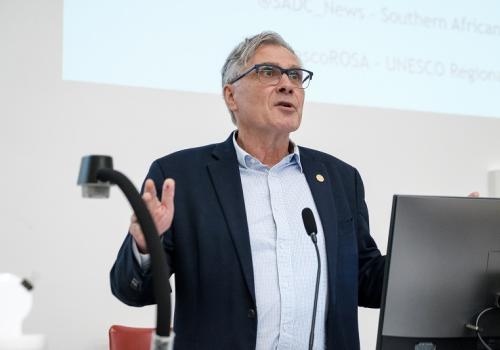The Southern African Development Community Secretariat (SADC), in partnership with the United Nations Educational, Scientific and Cultural Organisation (UNESCO), the South African Department of Science and Innovation (DSI), the National Research Foundation-South African Agency for Science and Technology Advancement (NRF-SAASTA) and the South African Science Journalists’ Association (SASJA) convened a three-day Science Journalism workshop titled “Building Science Communication Capacity in the SADC region and Africa” at Stellenbosch University, Republic of South Africa, on 30th November to 2nd December, 2022.
The objectives of the workshop were to equip science journalists with creative and innovative ways to make complex science accessible to relevant audiences and the general public; provide guidance for people working in environments where science and research outcomes need to be made accessible to the general public and to science policy audiences and develop a framework that can be used by other journalists in the Member States to carry out science communication.
After completion of the three-day workshop, participants, identified issues facing African countries and the role of scientific researchers in addressing issues such as; health and epidemics, climate change, artificial intelligence, the role of science in national policy and decision making, including international cooperation and development, the role of Member States in creating an enabling environment for science and research, including moral support and public recognition of successful performance of scientific researches.
The workshop oriented participating journalists with skills in reporting or communicating about science to various audiences and through various media and also how to deal with misinformation, while being able to distinguish between pseudoscience and credible sources of evidence-based information. The journalists were also drilled on the use social media platforms to communicate about science, write about science in their own vernacular language and be able to negotiate with ease complex ethical dilemmas in science and science journalism.
Wim de Villiers, Rector and Vice-Chancellor of the University of Stellenbosch, when officially opening the workshop, highlighted that Science journalists and science communicators play an exceedingly important role in bridging the gap between lay public and the world of science, and most importantly, to deal with what the World Health Organisation has named an “infodemic of misinformation”.
Ms. Anneline Morgan, Senior Programme Officer responsible for Science, Technology and Innovation at SADC Secretariat underlined that the workshop is being convened in response to the decision of the SADC Joint Ministerial meeting on Education and Training and Science, Technology and Innovation where the Ministers urged the Secretariat and Partners to build the capacity of journalists in science communication to advance the importance of science and innovation development.
She encouraged the Member States to achieve the regional baseline of the agreed expected spending target of 1% investment in research and development as Gross Domestic Product (GDP) of the region.
The workshop was attended by participants from Botswana, Eswatini, Lesotho, Madagascar, Mauritius, Mozambique, Namibia, South Africa, United Republic of Tanzania, Zambia and Zimbabwe.

